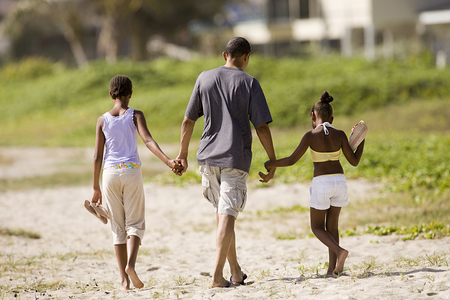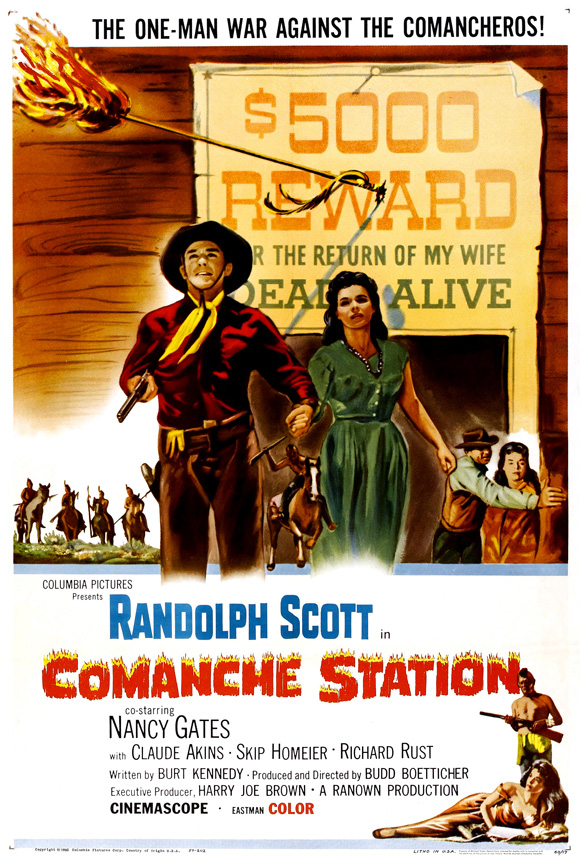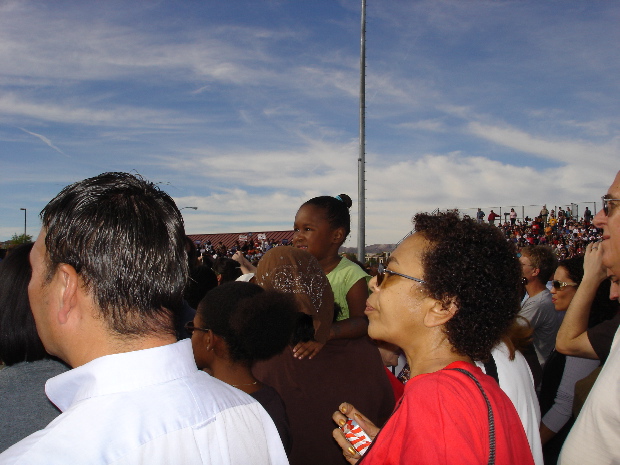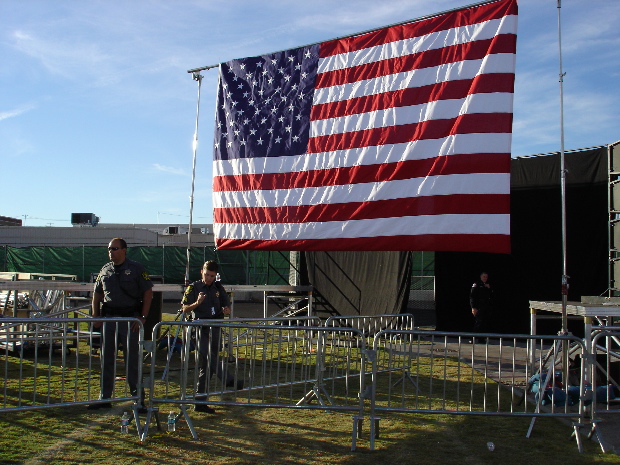There's no business like the show business . . .
[Image by Al Moore for Esquire, 1950.]

There's no business like the show business . . .
[Image by Al Moore for Esquire, 1950.]

It's still a little hard to believe.
For the first time in its history America has elected a President who was born in Hawaii.
I never thought I would live to see this day.
Mrs. L. is an elderly black woman who lives here in Las Vegas. I'm guessing she's in her nineties, and she gets around with a walker/chair device. She won't allow herself to be pushed in the chair, for two reasons. One, she wants to get as much exercise as she can. “If I stop using my legs,” she says, “I'll lose them. Then where would I be?” Two, she doesn't trust anyone to push her. “I let someone push me once,” she says. “They took a turn too fast and we both went over. So now when someone says, 'Can I push you?' I say, 'No, thanks.'”
Mrs. L. wanted to vote yesterday and the Obama campaign asked me to drive her to her polling place, which was about half a mile from her home. She lives in an apartment complex for seniors close to where I live. I had to walk down a long corridor to her apartment. She was sitting outside her door in her walker-chair waiting for me. She was dressed to the nines, wearing a bright purple blouse that looked brand new, a stylish floppy white hat with a brim, a necklace with big white plastic beads, white slacks and white sandals with flower decorations. She looked like a million bucks — and she meant to.
She had a hard time getting into the front seat of my big car. She was thrilled when I offered her a Coca-Cola, and even more thrilled when she tasted it. “That's the real thing!” she exclaimed. I told her it was a Mexican Coke, made with real sugar — “like when we were kids.” “They don't taste like this anymore,” she agreed.
I helped her through the voting procedure at the poll set up in the recreation lounge of a senior center. There were a lot of older people there to vote, but they all looked at Mrs. L. with astonishment — she was older by far than all of them. “How old is she?” a woman whispered to me. “I don't know,” I said. “I'm afraid to ask.” “God bless her for getting out to vote,” the woman said.
Mrs. L. grew up in Indiana — “I'm what they call a Hoosier,” she said. She moved to Las Vegas several years ago, after her husband died, because she has a daughter who lives here, but her daughter is in bad health. She has grandchildren and great-grandchildren. She is a person of great personal dignity — which is why I wouldn't have dreamed of asking her age.
When the poll workers had trouble locating her name in their bound pages of district voters, Mrs. L. said, “I know my name is in that book.” It was, and she added her signature for the 2008 election in a steady hand, with big, bold, elegant letters.
Afterwards, getting back into the car, she said, “Well, that's done.” “We've been part of history today, Mrs. L.” I said to her. She shook her head in amazement. “Yes, we have. Yes, we have.” “It just goes to show that if you live long enough,” I said, ” you'll see everything eventually.” She laughed delightedly and said, “Isn't that the truth?”
When I said goodbye to her back in her super-clean, sparsely furnished apartment, and shook her hand, she said, “If there were more people like you and me, the world would be a better place.” I had to beat a hasty retreat before she saw I was crying. It wasn't just the kind compliment that got to me — it was more a delayed reaction to something that happened as we drove away from the polling place. We passed a young black woman walking up to vote who had her five or six year-old daughter with her. Mrs. L. addressed the child under her breath, “You put your name in that book, too, little girl. You write your name in that book.”

Well, tomorrow is the big day — five of the Randolph Scott/Budd Boetticher Westerns are going to be released on DVD for the first time, including Boetticher's masterpiece Comanche Station. The box set will mark a major moment in American film culture — a chance for many to see these extraordinary films for the first time. Though not as profound as Ford's Westerns, spiritually speaking, Boetticher's oaters are almost as exquisite cinematically, though in a subtle, quiet way. They're largely about the way men, on horseback and on foot, move through landscapes, inhabit space, and how this activity reveals who they are and what they're about. On that level they're examples of pure cinema, since only cinema can operate on that level.
Apparently there's some sort of election going on tomorrow as well, which will also be worth paying close attention to. I've posted a link to this clip before, but give it another look as we await the morrow's events:
This is Bob Dylan, joined by Joan Baez, singing Dylan's song at the march on Washington, 28 August 1963, the occasion of Martin Luther King's “I Have A Dream” speech. In the song, Dylan, twenty-two years-old, envisions, like King, a time when the dreams of the civil rights movement will be fulfilled. Like King, also, he draws on Biblical imagery, on the rhetoric of prophecy, which alone seemed appropriate then to such awesome hopes, bucking such awesome tides.
Today, the hour when the ship comes in may feel as though it was always inevitable. Back then, it was only proclaimed with assurance by voices crying in the wilderness, by those who put their strongest faith in God's justice, not man's. The times when the two converge are rare, times of jubilee.
Once it seemed that love would never die, but . . .
Golden girls and boys all must,
Like chimney sweepers, come to dust.
Yet another image by Laurie Lipton from her Day Of the Dead series, inspired by Mexican folk iconography associated with the holiday and more specifically by the calaveras in the prints of Posada . . . but given an eerie, unsettling precision and naturalism. I like the way the lovers' bed is a bare mattress, as though its sheets have rotted away, dissolved in time, like the lovers' flesh.
Today just after dawn I found myself driving into the rising sun on Sunset Road, heading to Coronado High School in Henderson, Nevada, an upscale suburb of Las Vegas. I was going there to hear Barack Obama speak. It was the second time I'd tried to attend one of his Las Vegas rallies. The first time, at a much bigger venue and a far less ungodly hour, I hadn't been able to find a parking space within walking distance of the stadium he was speaking at.
This time I found an empty lot, a little patch of undeveloped desert, behind a business park about a mile from the high school. As I walked to the school I saw cops on horseback patrolling the closed-off street in front of it — who knew that Las Vegas had horse cops?
A relatively small crowd turned out — around three thousand according to the estimate of police on the scene. It didn't look like a Henderson crowd — it had a working-class feel. It was about two-thirds black, with lots of African-American families in attendance — many mothers and fathers holding their small children up on their shoulders to get a glimpse of the man who might become the first African-American President. You couldn't help but be moved by the sight.

I was also there mainly to be a witness to history in the making. I wanted to see “that one” in person just once. It took a while for things to get going. Along with a bunch of other truants I sneaked off behind the bleachers to have a smoke. (Big Nanny is turning America into an extension of high school by other means, to paraphrase a friend of mine.)
I sat on a low wall and puffed away with two young Latino kids, heavily pierced and tattooed. From the other side of the bleachers we heard things getting going, as someone sang “The Star-Spangled Banner” over the PA. The two Latino kids got up, took off their baseball caps, placed their hands over their hearts and stood at attention during the song. I did the same. We all clapped afterwards. Then I headed back to the field.
Senator Harry Reid managed to send the once-excited crowd into a funereal mood during his introduction of Obama. His speaking voice and style of oratory have the precise clinical effect of Ambien. Obama's appearance changed all that in an instant — the crowd went nuts as the tall, slim figure in shirtsleeves took the podium, looking very young and very weary. But he spoke well. Just before he came on I noticed that I'd lost my car keys, which distracted me a great deal during the speech. I'd heard it all before — it was his standard stump oration — so there was no great loss. You can just make out Obama below, between the woman's upraised hands:
The first time Obama mentioned John McCain the crowd started booing. “No, no, no,” Obama admonished. “You don't have to boo — you just have to vote.” The crowd gave him its most rousing cheer of the day. That's how a decent man campaigns for office in America — and how he encourages Americans to get excited and feel good about humane political discourse.
Afterwards I tried to locate someone who might know if there was a lost and found station where misplaced keys might turn up. The campaign workers and the cops were incredibly kind and sympathetic, but there was no lost and found station. Finally a campaign worker made an announcement that lost car keys should be brought to the stage, but none were.

At about this time I was interviewed by a Japanese TV crew about the rally. I tried to be cheerful about Obama and not look like a guy stranded in Henderson, Nevada without wheels and without apartment keys. A day of extreme vexation and very expensive taxi rides loomed ahead. I think the Japanese reporter, a cute young woman, chose to interview me because I was wearing a cowboy hat — that would probably play well back in Japan. She looked as though she was having a hard time holding back giggles when she asked her questions.
I decided to make one last inquiry at the security station at the entrance to the field. “Car keys?” said the cop I asked about a lost and found station. “See if they're in that pile there.” He pointed to a big pile of car keys at the bottom of a fence post. My keys were on top. I have no idea where I lost them or who found them. They probably fell out when I was sitting on the low wall smoking — so it may have been the Latino punks who found them and turned them in. God bless whoever it was.
Another miraculous day at the end of Campaign '08.
Today was the last day of early voting in Nevada so I went down to my local Obama field office to volunteer to drive voters to the polls. I thought there would be a big rush to vote early on this last day, and so did the folks at the field office, but in the end I just got one assignment — a young man named Scott who lives in a modest apartment complex about fifteen minutes from my house. He'd been contacted by an Obama volunteer named Laura who also lives in the complex. Scott doesn't have a phone so I rendezvous-ed with Laura and she brought Scott out to my car.
Scott had a two-hour window for voting — I picked him up at noon and he had to be back at 2 o'clock to look after his kids when his wife went off to work. I got a feeling that things weren't going too well for Scott in Las Vegas, economically speaking. He mentioned that he was thinking of moving to North Carolina, because he'd heard the job opportunities were better there. He was excited about Obama but took the rest of the ballot just as seriously. He'd already been to a polling place to get a sample ballot so he could study it. He had with him a hand-written list of the candidates he wanted to vote for for local offices.
He was pleasantly surprised when I offered him some Gatorade from a cooler in the back of The Ghost — I wanted to be prepared just in case people had to wait for a long time in lines outdoors. “You've got ice, too,” he said. “We should go fishing after this!” We talked about how much we loved fishing.
His local polling place was located in the Sears Court of the Meadows Mall — seen above without the election machinery in place. (Nevada is way ahead of the rest of the country when it comes to making voting convenient — there are early voting stations in supermarkets as well.) There looked to be about fifty voting machines in the center of the court, with a long line of people waiting to use them. When we joined the back of the line an election board volunteer told us the wait would be about 13 minutes — and that's almost exactly how long it was.
Scott took a while at his machine, checking his list. Watching the crowd of voters while I waited for him I got very emotional. Here were a bunch of regular folks in a mall choosing the next leader of the free world. They all looked incredibly proud, almost beatific, as they handed off their election cards at the end of the process and received their sticker saying “I Voted”. For one moment each of them had stood in absolute equality with every other American citizen — their opinion absolutely equal to the opinion of anyone else.
You can try to appreciate the process of democracy intellectually and philosophically, but you can't get close to the miracle of it until you see it in action like this, when a phrase like “the blessings of freedom” suddenly comes alive and grips the heart.
When I dropped Scott off at his home afterwards we shook hands warmly. “Let's hope we'll be partying on Wednesday,” he said. I held up crossed fingers and he laughed. He was back in plenty of time to look after the kids and I'd helped a fellow citizen have his say in one of the most important elections in American history.
Earlier we'd been talking about how amazing the Obama organization was. “It's like we're all pulling together on this,” he said — a thirty-something black man from New Jersey talking to a fifty-something white man from North Carolina, thrown together by chance and hope at a momentous time in a shopping mall in the middle of the Mojave Desert.
America . . . it's just too much, just too cool.